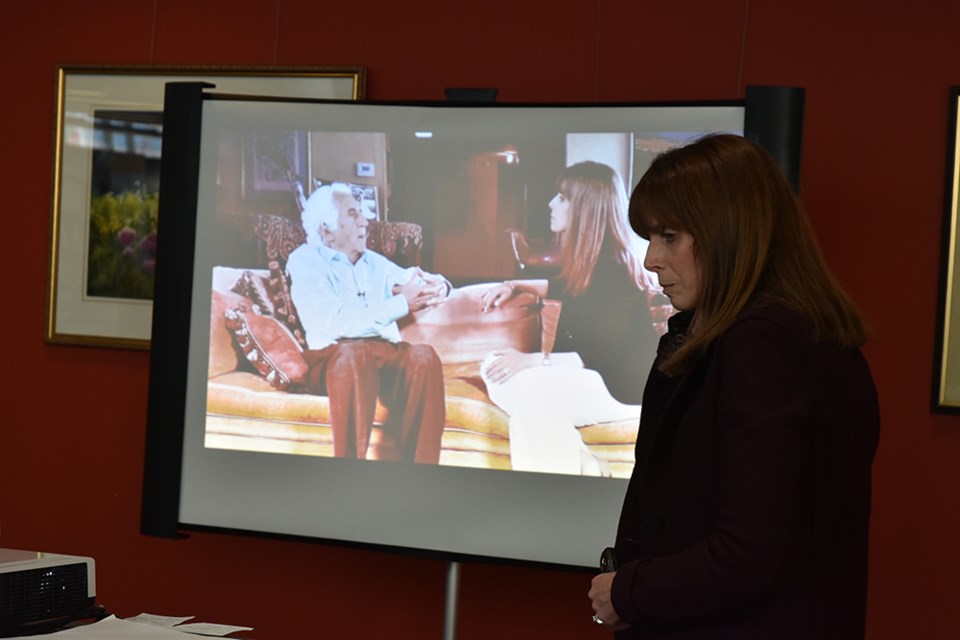Bill Glied was born Vojislav Eliezer Glied in Subotica, Serbia in 1930.
His family, who were Jewish, owned a flour mill, living and working peacefully alongside their non-Jewish neighbours.
Located near the border with Hungary, Subotica had a thriving Jewish community. Various sources suggest that, before the Second World War, between 5,000 and 6,000 Jews lived in the Vojvodina region in which Subotica was located.
But everything changed in April of 1941, when Nazi Germany invaded Yugoslavia, and partitioned the country. Nazi restrictions on Jews began to be imposed.
Jews had to wear a yellow Star of David, setting them aside from the rest of the population. There were restrictions where they could shop, work, and even walk.
The family flour mill, established in the 1700s, was seized. In school, a young Glied was among four Jewish students who were told they could no longer sit with their classmates, but had to move to the back of the room.
The hardest thing was being told by his life-long playmate: “My father says I can’t play with you any more because you are Jewish.”
These memories of Subotica and what happened as Nazi policies spread into Serbia were shared by Glied’s daughter Michelle Glied-Goldstein at a Holocaust Education Week event sponsored by the BWG Diversity Action Group Nov. 4 at the Bradford West Gwillimbury Public Library.
Glied passed away in February at the age of 87. Glied-Goldstein shared his story and her memories of her father’s remarkable life and story of survival.
Because there was worse to come. In April 1944, all Jews in Subotica were told that they were to report to the school and bring “just what they could carry,” said Glied-Goldstein. Most packed a bag with family photographs, food and clothing.
“Nobody knew where they were going,” she said. “They thought they would be relocated to the east.”
As they walked through town to the train station, the street was lined with former neighbours, watching silently. “Nobody said anything,” Glied-Goldstein said.
At the station they were crammed into cattle cars, not heading east for relocation, but to Auschwitz-Birkenau concentration camp. Glied, 13 years old at the time, and his father were chosen for slave labour and sent on Dachau. His mother and eight-year-old sister were killed in the gas chambers of Auschwitz.
For a year, father and son worked alongside each other under horrendous conditions, in the Kaufering III concentration camp — his father sharing his scant rations to help the boy survive. On April 29, 1945, American troops liberated the camp — too late for his father. He had died of typhoid just nine days earlier.
Orphaned, Glied spent six weeks recuperating in hospital before being sent back to Serbia to an aunt and uncle. He emigrated to Canada in 1947, where he spent months in a sanatorium, with a suspected case of tuberculosis, using the time to learn English.
In the 1950s, he built a business, met his wife, Marika, and started a family.
For the past two decades, Glied was passionate about sharing his memories of the Holocaust, especially with young people.
“I had to share my story with the world so that it will never be forgotten,” read the 2014 Bill Glied Manuscript Project. “Remembering history helps ensure it does not happen again. The suffering of these innocent people should not be forgotten. Their memory should not be lost.”
Glied-Goldstein noted her father never felt hatred or anger, but he was tireless in speaking at schools, conferences and other events, and even accompanied students on the annual March of the Living to the former death camps in Poland.
He didn’t hate, but he couldn’t forget or allow others to forget, she said. And he retained his faith in humanity — a common humanity.
The timing of the session at the library, just eight days after a deadly shooting at the Tree of Life Synagogue in Pittsburgh, Pa., made the message all the more important.
"The horrific attack in Pittsburgh... shows that we must continue to tell the stories and experiences of the Holocaust. We can't ever become complacent about antisemitism or any form of hate," said Naomi Hoffenberg, a member of the BWG Diversity Action Group.
The Subotica Synagogue, once the fourth largest in Europe, is now a museum. In 2011, the Jewish population of Serbia was 787.



